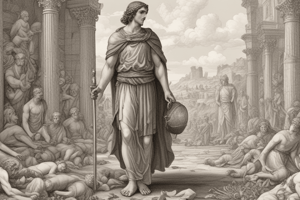Podcast
Questions and Answers
What does 'Arma virumque cano, Troiae qui primus ab oris' translate to?
What does 'Arma virumque cano, Troiae qui primus ab oris' translate to?
- I sing of arms and men, who first came from the shores of Troy (correct)
- I tell of battles and victories
- I sing of the gods and heroes
- I sing of love and loss
What does 'Italiam, fato profugues, Laviniaque ventit' mean?
What does 'Italiam, fato profugues, Laviniaque ventit' mean?
to Italy, a refugee by fate, and he came
What is described by the phrase 'litora, multum ille et terris iactatus et alto'?
What is described by the phrase 'litora, multum ille et terris iactatus et alto'?
to the Lavinian shores, he was tossed much on both the land and in the deep
What does 'vi superum saevae memorem iunonis ob iram' refer to?
What does 'vi superum saevae memorem iunonis ob iram' refer to?
Translate 'multa quoque et bello passus dum conderet urbem'.
Translate 'multa quoque et bello passus dum conderet urbem'.
What does 'inferretque deos Latio, genus unde Latinum' mean?
What does 'inferretque deos Latio, genus unde Latinum' mean?
Translate 'Albanique patres, atque altae moenia Romae.'
Translate 'Albanique patres, atque altae moenia Romae.'
What is the meaning of 'Musa, mihi causas memora, quo numine laeso'?
What is the meaning of 'Musa, mihi causas memora, quo numine laeso'?
What does 'quidve dolens, regina deum tot volvere casus insignem pietate virum, tot adire labores impulerit' translate to?
What does 'quidve dolens, regina deum tot volvere casus insignem pietate virum, tot adire labores impulerit' translate to?
Can such angers be in the heavenly minds?
Can such angers be in the heavenly minds?
Flashcards are hidden until you start studying
Study Notes
Overview of the Aeneid's Opening Lines
- The Aeneid begins with the phrase "Arma virumque cano," translating to "I sing of arms and men," highlighting themes of warfare and heroism.
- The protagonist is Aeneas, who is identified as a refugee from Troy, setting the stage for his epic journey to establish a new homeland in Italy.
Themes of Fate and Struggle
- Aeneas is portrayed as a man "fato profugues," emphasizing the concept of fate guiding his journey.
- His experiences include suffering and hardship, both on land and sea, demonstrating the theme of perseverance despite adversity.
Juno's Anger and Divine Influence
- The text references "saevae memorem Iunonis ob iram," indicating Juno's persistent anger influencing events—a recurring theme in the Aeneid.
- This divine conflict drives much of the narrative, as Aeneas faces the wrath of the gods.
Founding of a New Civilization
- Aeneas's goal is ultimately to "found a city" in Italy, signifying the beginning of Roman civilization.
- His journey involves bringing deities to Latium, which connects the divine with the human endeavor to establish a prosperous society.
Connection to Roman Heritage
- The mention of "Albanique patres" and "altae moenia Romae" links Aeneas to the origins of Rome and its ancestral figures, establishing a foundational narrative for Roman identity.
Invocation of the Muse
- The speaker calls upon the Muse for inspiration to recount Aeneas's story, emphasizing the importance of divine guidance in epic poetry.
Exploration of Divine Emotions
- The phrase "Tantaene animus caelestibus irae?" questions the capacity for divine beings to harbor such anger, inviting reflection on the nature of the gods and their influence on human affairs.
Significance of Piety
- Aeneas is characterized by "insignem pietate," underscoring the virtue of piety—an essential trait for Roman heroes that emphasizes duty to gods, family, and country.
- His challenges are framed as part of his moral journey, reinforcing the importance of virtue in the face of trials.
Studying That Suits You
Use AI to generate personalized quizzes and flashcards to suit your learning preferences.




